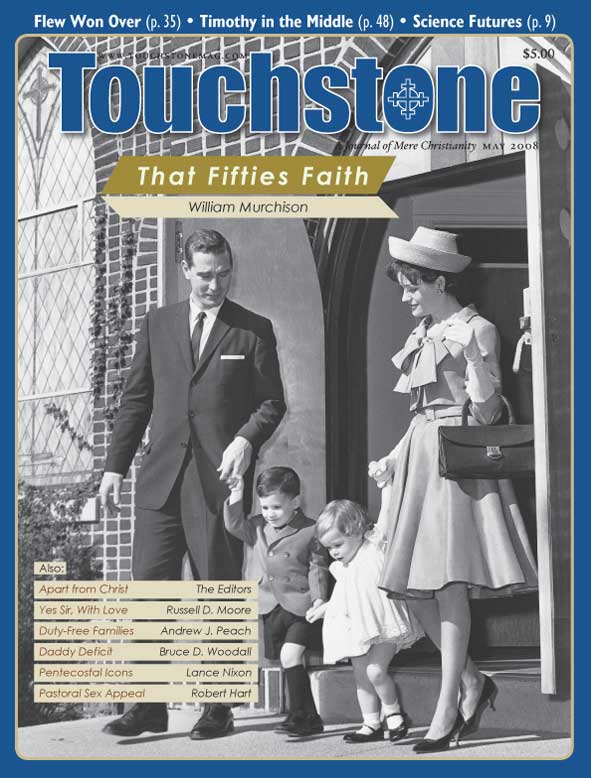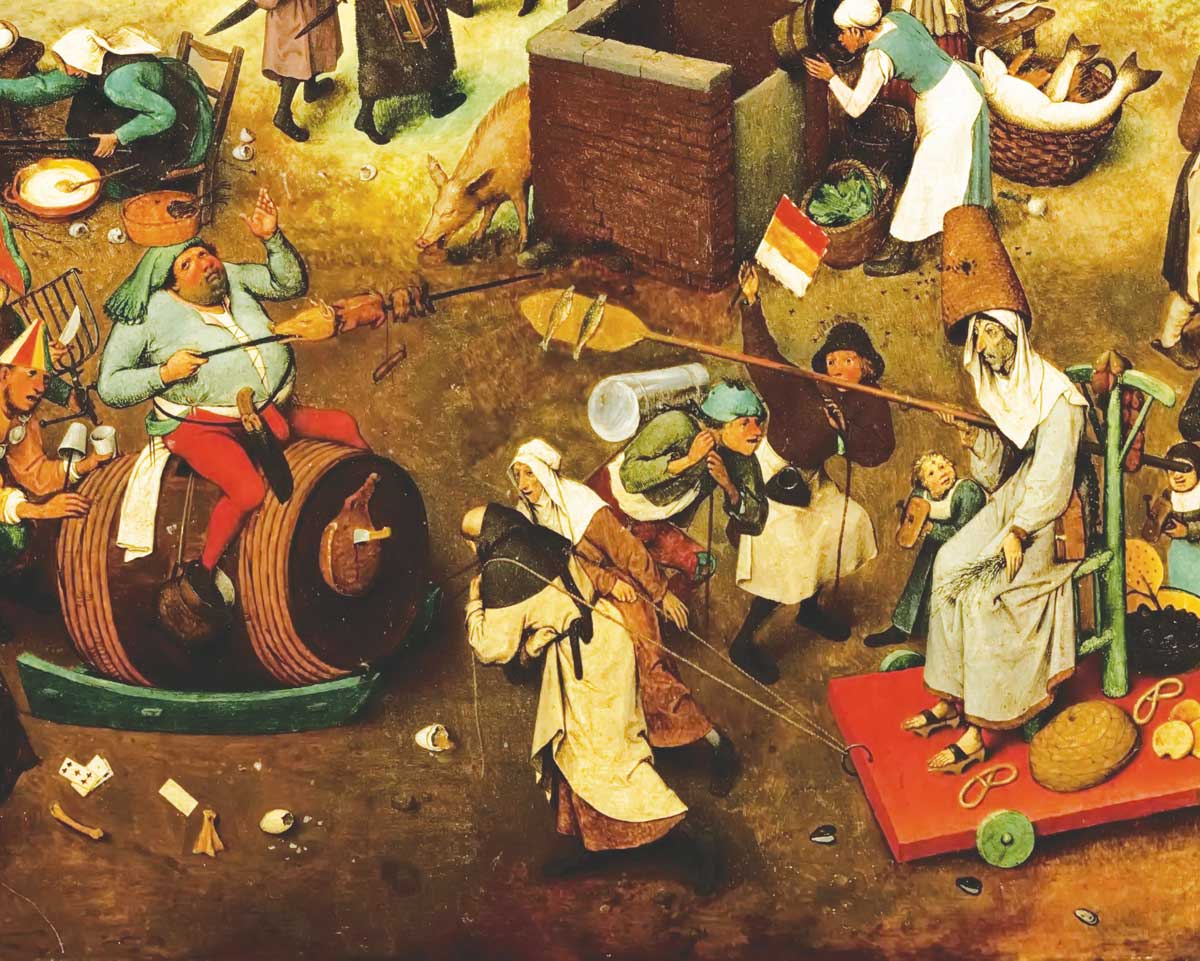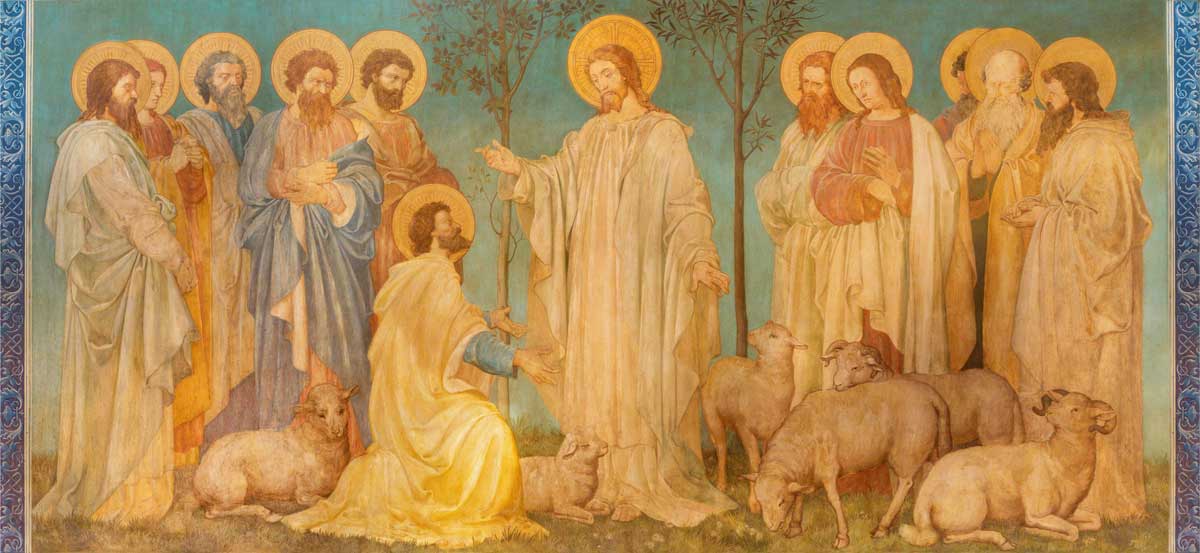Without the Cornerstone
When Secular Builders Labor in Vain
“Take him away!” So said the crowds that bullied Pontius Pilate into surrendering to their judgment a man he knew was innocent. Not that Pilate required much persuading. But suppose man could have done just what the crowds were crying for. Suppose we take Jesus away? What does the world look like, if we take him away?
It is not easy to imagine the non-existence of the most influential man in the history of the world. Imagine, by contrast, what would have happened if Mohammed had died as a young trader in the desert, or if he had not had epileptic seizures, or if he had never been born. North Africa and the Middle East might not now be hot-spots of armed conflict. Perhaps Western and Eastern Christianity would not have gone their (partly) separate ways. Perhaps Tripoli and Alexandria would look like Brussels and Paris. Perhaps, but perhaps not.
But if Jesus had never lived?
A Hazy Belief
Consider just the idea that all men are brothers, so obvious to us that we think of it as a belief all reasonable men must share.
This idea could be found in the wheezing and creaking Greco-Roman world—in Plato, in Epictetus, in Marcus Aurelius—yet somehow the idea, in ancient Greece and Rome, remained largely theoretical and hazy. It found little play in one’s daily life. Apparently it could be held, theoretically and hazily, by many a slave owner. And there were, of course, other philosophers who disagreed.
It is true that Stoicism had slowly introduced the idea of the common humanity of slave and owner, and that laws punishing cruelty to slaves had become wellestablished in the first century of the Roman Empire. It is true, too, that many slaves rose to positions of great authority in the imperial bureaucracy, and that the philosopher-slave Epictetus was, in his day, quite a celebrity.
Yet slavery was not about to disappear any time soon. The grain fields depended too heavily upon it, as did the quarries and the mines. Slaves were too important to the comfort of those who made the laws.
And the Greeks and Romans had, other than those hazy and theoretical ideas, no real reason to think the slave was anything but a slave. He might have great authority, or even become a celebrity, if he was good at doing what he was told to do, but he was still essentially, naturally, properly, a slave.
Such was life in the world into which our Lord was born, died, and rose again, and into which the Holy Spirit descended. Imagine this world, a world in which it seems natural that there should be slaves. Imagine a world without the revolutionary idea that the king is no better than the slave (an idea not to be found even in Aristotle), and the even more revolutionary idea that someday that king would have to answer to that slave.
Imagine a world not formed by the belief that the Son of God died for everyone, impartially, that the powerless, ignorant, impoverished man cleaning sewers was loved just as much as the king on his throne, the priest in his temple, the scholar in his library, and the rich man in his factory. Imagine a world not formed by the knowledge that at death the king might descend to the lowest circles of hell and the slave rise to the highest circles of heaven.
Not that the Christian world lacked for slaves, to our shame, but though her slaves were bound by laws and circumstances, they were not chained down by belief. Sinful men will always abuse others, and to justify it, will descend some way to the natural belief in the superiority of some men (themselves) over others, but always before such men, in the Cross of Christ, is not just a theory about equality but the reality of human brotherhood bought at the cost of the life of the Son of God.
This reality would, over time, work itself out in the societies that saw it. It would change society radically. It did change society radically.
A World Without Christ
Imagine wiping out of human consciousness the idea that a God of love exists, who has made man to be free. The Greeks and Romans, after a long denouement, might have given up the old pantheon, but they would have given it up in favor of a vague pantheism, or a vague Neo-Platonic deism, and that is thin fare for the human heart.
It seems likelier that the people would have lurched from one pantheon into another, especially once the German and other barbarians came roaring into the old cities. Whichever pantheon our Roman ancestors might have settled upon, it would not have included the God-Man, nor the confident belief in human brotherhood he made possible.
Would the Enlightenment, that parasite upon a dying Christendom so lauded by our ungrateful schools as the source of every good thing, have provided us with the idea? Not without the person of Christ.
Without Christ, the Enlightenment gave us the “science” to prove that certain peoples and races are naturally inferior. It also gave us the templates for every totalitarian regime spawned in the West ever since, with hard distinctions between groups of people, based on class or race or sex or tribe or language or party, distinctions believed to justify the mistreatment of the lower by the higher. That is what the world sinks to without Christ.
For where men have tried to eliminate God, we have seen that inhuman belief surging back. The Bolsheviks tried to create a society without any God (and in their case, without the Christian God in particular), and quickly began to judge certain groups as inferior, particularly those so unenlightened as to fail to see the Bolsheviks as their saviors.
And indeed they treated everyone alive at their time as inferior to those who would live in the future, so that any present suffering was justified if it produced a better world for their descendents. Their worship of inequity came in a peculiarly modern mode, but it was no different, in essentials, from that of the Romans.
I don’t think the history of civilizations warrants our supposing that without Christ we would now enjoy, across much of the world, the freedom, the guarantees of human rights, the concern for the marginalized, the hope for just government, or the care for the oppressed that we take for granted. It was not the Enlightenment that enlightened us in this matter. It was Christianity.
If this seems an extreme claim (it is not what the age’s standard myth proclaims), try an experiment. Suppose that some malign being is forcing you to be born into another society. It is letting you choose the nation, but not the class, into which you will be born, and upon being born, you could find yourself in any part of that society, high or low (the odds favor low, of course). Would you choose a Christian country, however far it has fallen into secularism, or a Hindu or Buddhist or Islamic or Marxist country? Into which would you rather be born poor (especially if you are a woman)?
Jesus Changed the World
Wipe from the consciousness of every man and woman on earth the conviction that the meek shall inherit the earth; that the peacemakers shall see God; that the kingdom of God belongs to the poor; that the merciful shall obtain mercy; that where sin abounds, grace abounds all the more. Wipe those ideas out. Wipe out that God of love, and return to him only that primal power that man adores wherever he thinks he sees it.
And then give those people modern technology. This is not a world you would want to live in. Jesus changed the world even for those who do not call him Lord. Even those who will not let him save them from the pains of hell have been saved by him from the pains of life in a world without brotherhood.
— Anthony Esolen, for the editors
Anthony Esolen is Distinguished Professor of Humanities at Thales College and the author of over 30 books, including Real Music: A Guide to the Timeless Hymns of the Church (Tan, with a CD), Out of the Ashes: Rebuilding American Culture (Regnery), and The Hundredfold: Songs for the Lord (Ignatius). He has also translated Dante’s Divine Comedy (Random House) and, with his wife Debra, publishes the web magazine Word and Song (anthonyesolen.substack.com). He is a senior editor of Touchstone.
subscription options
Order
Print/Online Subscription

Get six issues (one year) of Touchstone PLUS full online access including pdf downloads for only $39.95. That's only $3.34 per month!
Order
Online Only
Subscription

Get a one-year full-access subscription to the Touchstone online archives for only $19.95. That's only $1.66 per month!
bulk subscriptions
Order Touchstone subscriptions in bulk and save $10 per sub! Each subscription includes 6 issues of Touchstone plus full online access to touchstonemag.com—including archives, videos, and pdf downloads of recent issues for only $29.95 each! Great for churches or study groups.
Transactions will be processed on a secure server.
more from the online archives
calling all readers
Please Donate
"There are magazines worth reading but few worth saving . . . Touchstone is just such a magazine."
—Alice von Hildebrand
"Here we do not concede one square millimeter of territory to falsehood, folly, contemporary sentimentality, or fashion. We speak the truth, and let God be our judge. . . . Touchstone is the one committedly Christian conservative journal."
—Anthony Esolen, Touchstone senior editor









